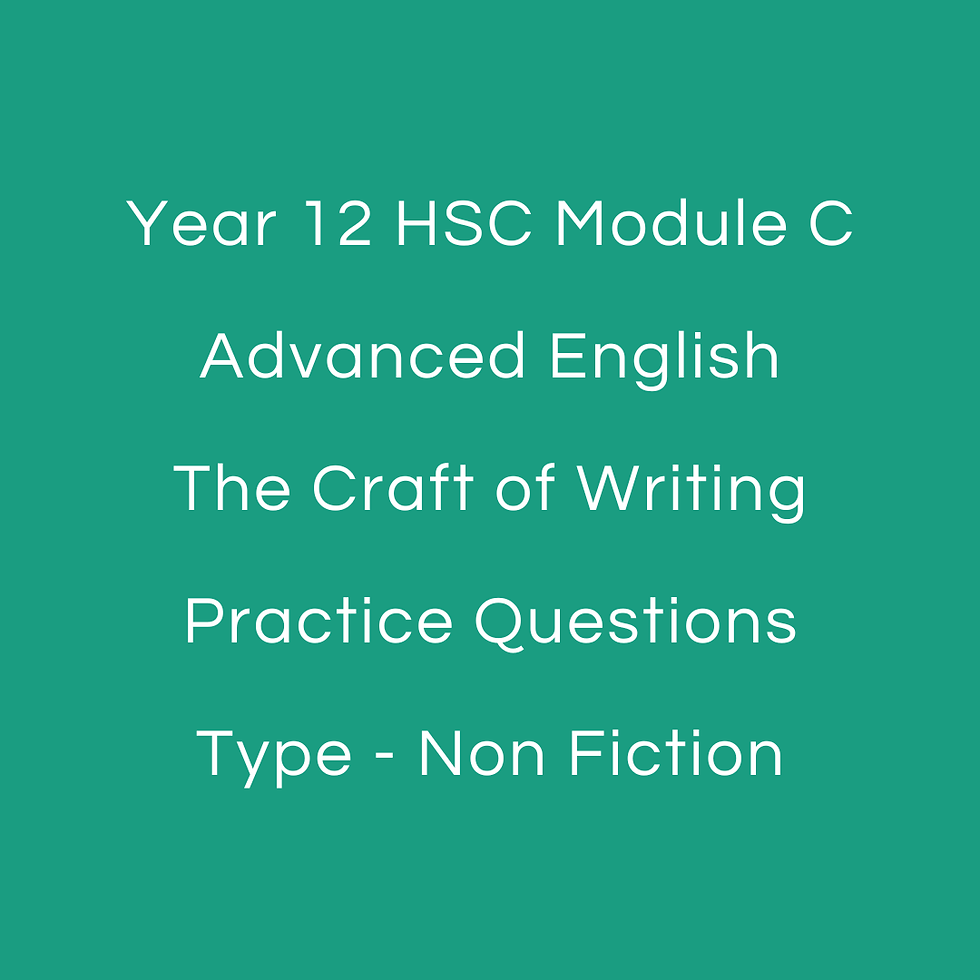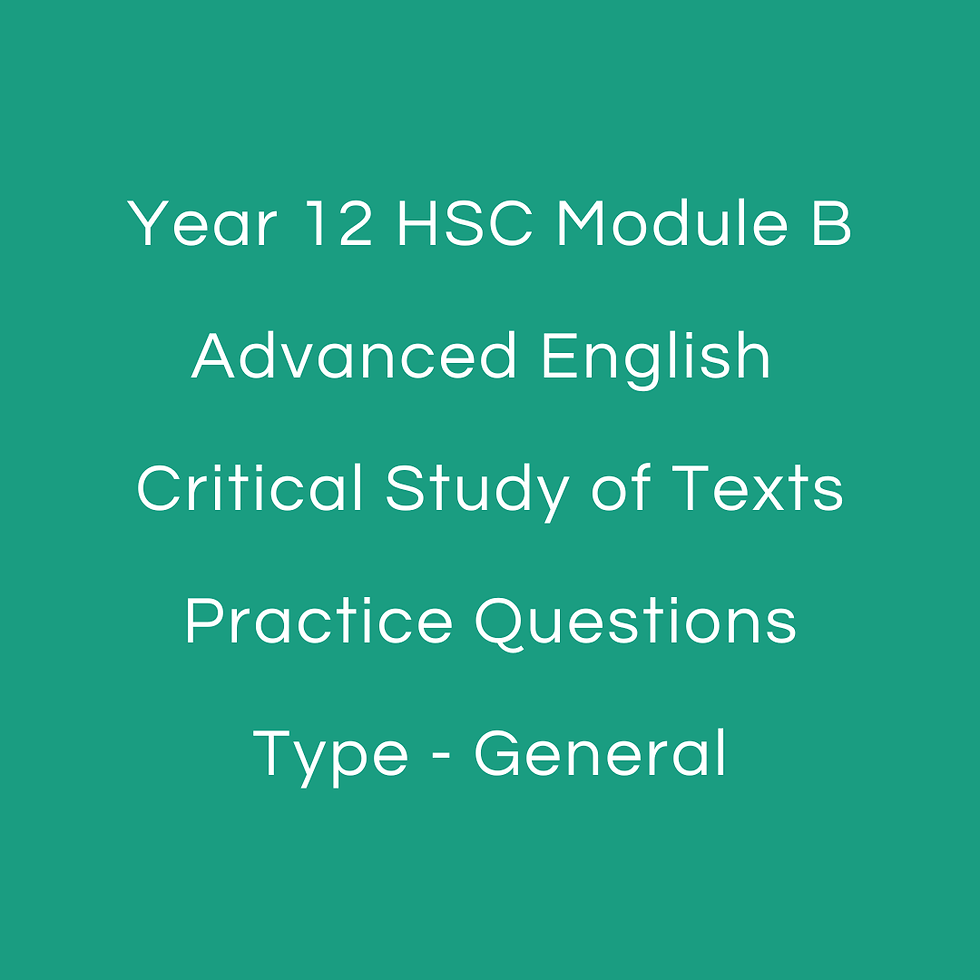HSC Year 12 - Paper 2 Section 3 - Module C - The Craft of Writing - Practice Questions - Conceptual Mini Extracts (Fiction)
- christalcapital

- Oct 11
- 4 min read
1. “We live through stories. Some we inherit, some we resist, and some we rewrite.”
He turned the page of his grandfather’s notebook, its ink faded, its words stubborn. The same tale rewritten through generations—names changed, endings softened. Yet the ache remained: how much of one’s story is chosen, and how much is inherited, whispered from those who never found the courage to resist? He wondered if rewriting a story meant betraying it, or finally setting it free.
a) Write an imaginative piece exploring the tension between tradition and self-definition. 12 marks b) Explain how your piece explores the way personal narratives can both constrain and liberate the individual. 8 marks
2. “Certainty is comforting. But ambiguity is where truth often resides.”
She used to believe truth was a solid thing—a lock clicking shut. Now, it feels like fog moving through light, shape without form. Every answer births another question, and comfort trembles before doubt. Yet somehow, in the blurred edges, she finds something more enduring than certainty: the freedom to keep wondering, to live inside the question instead of its cage.
a) Write a discursive piece that unpacks the human need for certainty in an uncertain world. 12 marks b) Explain how you shaped your voice and structure to encourage intellectual curiosity rather than resolution. 8 marks
3. “The smallest moments often echo the loudest.”
A droplet trembled on the windowsill, refracting morning into miniature worlds. He almost wiped it away, but paused. In that hesitation lay everything—grief, hope, the ache of remembering what once was simple. The drop fell, silent, yet the sound lingered somewhere deep within his chest. Later, he would call it nothing, though it changed the quiet of his day.
a) Compose an imaginative piece that captures a fleeting, seemingly insignificant moment that alters perception. 12 marks b) Explain how language and form were used to magnify stillness and interiority. 8 marks
4. “What we silence becomes what shapes us.”
At dinner, they spoke about the weather, the news, anything but the thing that mattered. Silence draped over them like heavy cloth, muting breath, shaping posture. Later, in the dark, she realised the silence was not absence but inheritance—a language passed down without words, teaching her restraint. It lived in her throat, quiet but commanding, like an heirloom no one dared return.
a) Write a persuasive piece arguing for the importance of giving voice to suppressed histories or identities. 12 marks b) Discuss how rhetorical strategies were employed to challenge apathy and evoke urgency. 8 marks
5. “Growth rarely arrives with comfort.”
The soil resisted her touch—cold, unyielding. She pressed the seed anyway, uncertain if anything would grow. Each day she waited, hands aching, doubts sprouting faster than the roots below. Then, one dawn, a fragile green cracked through the dark earth. It was smaller than she imagined, yet stronger too. Growth, she realised, begins as breaking, not blooming.
a) Write a discursive or imaginative piece that explores the uneasy process of personal transformation. 12 marks b) Explain how shifts in tone and structure mirror the emotional dissonance of change. 8 marks
6. “To be seen is to be understood. Or is it?”
The photo gathered likes before she could even blink. Everyone saw her smile, the perfect frame of joy. No one noticed the tremor in her fingers, or how her eyes tilted away from the light. Visibility, she thought, is not the same as understanding. The lens records, but rarely listens—and what it captures may never resemble truth at all.
a) Compose a discursive piece examining how modern representations of identity shape or distort connection. 12 marks b) Explain how your perspective was informed by lived or observed experiences, and how voice was adapted accordingly. 8 marks
7. “Home is not always a place.”
He found it not in walls but in gestures—the way his friend poured tea without asking, the way laughter stitched the night. The city changed, postcodes shifted, yet the warmth lingered. Perhaps home was never a location at all, but a rhythm of kindness repeating itself across distance, a feeling that travelled quietly, refusing to be mapped.
a) Write an imaginative or discursive piece that explores the concept of belonging beyond physical spaces. 12 marks b) Explain how setting and imagery were manipulated to evoke abstract senses of home. 8 marks
8. “We fear forgetting, yet we are always rewriting.”
Old photographs faded in the drawer, their edges curling like memories resisting permanence. She tried to recall the faces, but each time they returned softer, kinder, rearranged by time. Forgetting wasn’t erasure; it was revision—memory’s quiet mercy, sanding the harsh corners of what was once too sharp to touch, rewriting sorrow into something she could bear.
a) Write an imaginative piece that explores memory as both unreliable and essential. 12 marks b) Explain how you used time, structure, or perspective to reflect the fragmentation of memory. 8 marks
9. “There is power in remaining soft.”
They mocked her gentleness, mistaking quiet for weakness. Yet when the storm came, it was her stillness that steadied them, her calm that endured. She learnt that softness was not surrender but resilience—a deliberate choice to remain open. To stay soft, she realised, is to resist becoming the very hardness that causes harm.
a) Compose a discursive or persuasive piece examining the value of gentleness and vulnerability in a harsh world. 12 marks b) Explain how you established voice and tone to challenge conventional perceptions of strength. 8 marks
10. “Every voice contains echoes of another.”
His words carried the lilt of his mother’s accent, though he’d long trained it away. When he read aloud, he heard her in the pauses, the half-smile between syllables. Voice, he realised, is never singular—it is a chorus, layered with ghosts who once dared to speak. To find his own, he had to listen first.
a) Write an imaginative or discursive piece that explores the intergenerational or cultural inheritance of voice. 12 marks b) Explain how you layered your piece with allusion, metaphor, or tone to honour voices past while crafting something distinctly your own. 8 marks



Comments